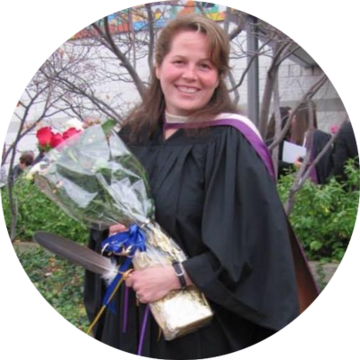VALUE: COMMUNITY
![]() We build meaningful and impactful relationships and collaborations in our Faculty, on our campus and beyond. We foster a sense of belonging as we support our community’s well-being, growth and success. - From the Faculty’s Strategic Plan 2020-25
We build meaningful and impactful relationships and collaborations in our Faculty, on our campus and beyond. We foster a sense of belonging as we support our community’s well-being, growth and success. - From the Faculty’s Strategic Plan 2020-25
Here’s how one alumnus is living this value:
Cynthia-Anne Martin (pictured above, centre) identifies gaps in community services and what people in different community groups need, and helps fill those gaps.
Martin (BA ’99, Therapeutic Recreation), an Indigenous police officer with the Waterloo Regional Police, has spent her career building community bridges. She is currently on secondment to Wellbeing Waterloo Region, a community collaborative network with about 130 members from 70 different agencies. She also co-ordinates equity training, and has worked with leaders such as Kike Ojo-Thompson and her consulting group, making sure that smaller community organizations that can’t normally afford such training have access to it.
Her work with Wellbeing Waterloo Region dovetails nicely with her police background, which has spanned the gamut from patrol work to being a community resource officer and crime prevention officer.
Martin is aware that when people see a police officer, they usually see “a system,” rather than a person.
“They see the uniform. They see the firearm. They see the buildings. They see the cruisers,” says Martin.
She rarely wears her uniform in her various community roles, but when she does, she makes a big effort to take the time to have conversations with people in the community so that they understand her as a whole person and as part of a community.
At the same time, she has strived to help fellow police officers understand the unique perspectives of Indigenous, immigrant and racial minority communities.
A chance encounter
One reason she was drawn to the University of Waterloo was because it had a co-op program that allowed her to work while completing her degree.
 She initially chose the Recreation and Leisure Studies program because she liked sports and thought she might pursue a sports-related career. But then she had a chance encounter with someone she knew who volunteered as an auxiliary police officer. She decided to give that a try, and realized she liked policing. After volunteering with Peel Regional Police Auxiliary and then the OPP, she was hired by the RCMP in 2002, and decided to stay local with the Waterloo Regional Police.
She initially chose the Recreation and Leisure Studies program because she liked sports and thought she might pursue a sports-related career. But then she had a chance encounter with someone she knew who volunteered as an auxiliary police officer. She decided to give that a try, and realized she liked policing. After volunteering with Peel Regional Police Auxiliary and then the OPP, she was hired by the RCMP in 2002, and decided to stay local with the Waterloo Regional Police.
She also explored her Indigenous roots more deeply and became involved with the Indigenous community locally; Martin’s parents have Mi’kmaq ancestry and came to Ontario from Canada’s east coast. She has been on the boards of organizations such as Anishnabeg Outreach and the White Owl Native Ancestry Association in Kitchener. She completed a Master of Social Work in the Indigenous Field of Study at Wilfrid Laurier University in 2013.
Along with her liaison with Indigenous groups, she also did a lot of work as a police officer with new immigrant communities, who often are coming from countries where people are extremely fearful of the police.
Trust is a barrier
In 2018, the secondment to Wellbeing Waterloo Region came up and she grabbed it. It was an opportunity to use her extensive background working with community organizations.
As an example, when COVID-19 hit, the First Nations, Métis and Inuit Advisory Circle that Martin chairs for Wellbeing Waterloo Region provided feedback on the challenges in limiting the spread of the virus among members of Indigenous communities.
The worry was that members of Indigenous communities might carry the virus back to their home communities, which would not be well equipped with hospitals and health facilities. “There is not a lot of trust that health and well-being is being truly thought about when it comes to First Nations, Métis and Inuit people,” Martin says. “This can be attributed to the historical experiences of Indigenous communities with smallpox and other diseases.”
With COVID testing, the Advisory Circle members worked in conjunction with local health officials to set up pop-up testing sites in locations where members of Indigenous communities felt culturally safe and supported by members of their own communities, who could be present to provide support to both the medical staff and patients.
More work to be done
Given the recent criticism of police forces in the United States and Canada as a result of violent incidents toward Black and Indigenous community members, Martin feels strongly about the importance of education and reconciliation efforts with the communities they serve.
Concerns and frustration expressed by Indigenous communities include the lack of attention to the Missing and Murdered Indigenous Women and Girls Report, the disproportionate number of people in their communities who are incarcerated, as well as a lack of trust that stems from a history fraught by residential schools and colonialism.
So, Martin acknowledges there is more work to be done. She believes that an organization like Wellbeing Waterloo Region, which has an overarching vision of creating a community where “everyone thrives and no one is left behind,” can be instrumental in the changes that are needed.
“Really, when we dig deep into these conversations, we all want the same thing, which is peace in our communities,” she says.






